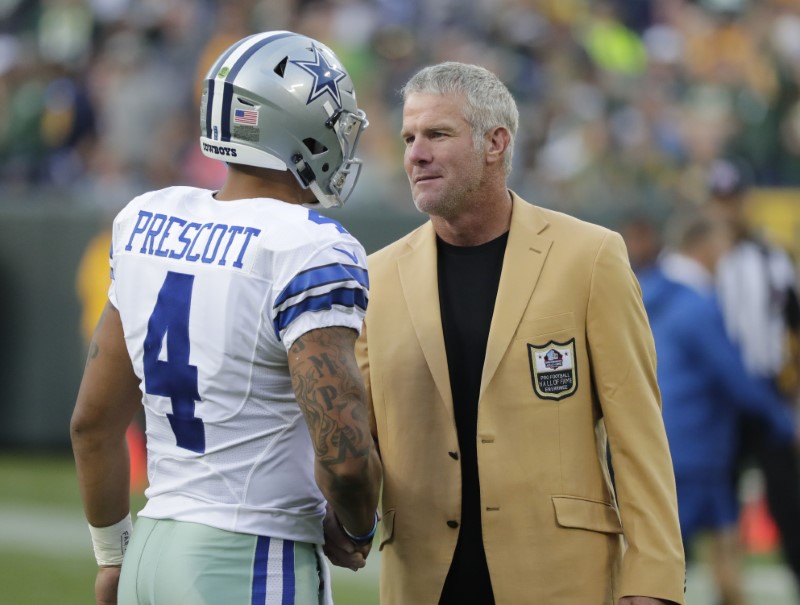
Oct 16, 2016; Green Bay, WI, USA; Dallas Cowboys quarterback Dak Prescott (4) greets Former Green Day Packers quarterback Brett Favre (R) after being introduced to the Hall of Fame at Lambeau Field. Mandatory Credit: Jim Matthews/Wisconsin via USA TODAY Sports
May 21, 2018
Hall of Fame quarterback Brett Favre revealed that he went to rehab multiple times in addition to the one well-documented 1996 rehab stint during his playing days.
Favre told Sports Illustrated’s Peter King that he actually went to rehab two other times that were never made public. King reported their conversation in the final installment of his MMQB column on Monday, in which he recounted a week he spent with Favre for a cover story for the magazine.
“Oh, I remember that week,” Favre recounted to King in a phone call. “You thought, ‘Man, this guy’s high on life.’ You didn’t know there was a reason for it. It is really amazing, as I think back, how well I played that year. That was an MVP year for me. But that year, when I woke up in the morning, my first thought was, ‘I gotta get more pills.’ I took 14 Vicodin, yes, one time. I was getting an hour or two of sleep many nights. Maybe 30 minutes of quality sleep. I was the MVP on a pain-pill buzz. The crazy thing was, I’m not a night owl. Without pills I’d fall asleep at 9:30. But with pills, I could get so much done, I just figured, ‘This is awesome.’ Little did I know (wife) Deanna would be finding some of my pills and when she did, she’d flush them down the toilet.”
Favre’s lengthy rehab stint in 1996 to deal with his addiction to Vicodin became part of his legend, but he says now that he actually tried to beat his addiction to pills once before and wound up in rehab again later to deal with a drinking problem.
“I actually went to rehab three times,” he told King. “I saw the most successful, smart people — doctors, professional people — lose it all, ruin their lives. A year or two before you saw me, I went to a place in Rayville, La., just outside Monroe. It was pills then too.”
“Deanna and Bus (Cook, his agent) talked me into it. I didn’t think I had a problem, but they talked me into it. I went for 28 days. When I got out, I was able to control myself for a while. I wouldn’t take anything for a day or two, and I wouldn’t drink. But I was a binge drinker. When I drank, I drank to excess. So when I went in the second time, to the place in Kansas, I remember vividly fighting them in there. They said drinking was the gateway drug for me, and they were right, absolutely right, but I wouldn’t admit it. I will never forget one of the nurses. I had it all figured out. I fought with this nurse all the time. I would not admit the drinking problem. At the end she said to me, ‘You’ll be back.’”
He says he went back in 1998 for a 28-day program strictly for drinking and that the same nurse was there to greet him at intake.
Favre said earlier this year that he believes he has suffered “hundreds, probably thousands” of concussions over his football life and said if he had a son, he would try to convince him not to play football.
The former Packers icon told NBC News’ Megyn Kelly on the “TODAY” show that while he was only diagnosed with three or four confirmed concussions, he has had the sensation of “getting dinged” on countless occasions.
“When you have ringing of the ears, seeing stars, that is a concussion,” Favre said. “If that is a concussion, I’ve had hundreds, probably thousands, throughout my career, which is frightening.
“If I had a son myself… I would really, really, strongly discourage him from playing. And that seems to surprise people when I tell them.”
Favre shared his opinions as part of a panel discussion about concussions in sports, along with fellow Hall of Fame QB Kurt Warner, retired 15-year MLB veteran David Ross and U.S. Women’s National Team soccer legend Abby Wambach. The four former athletes are involved as investors in a company developing a drug, Prevasol, they hope can help in treatment of concussions. Prevasol has not yet been approved by the Food and Drug Administration and is still undergoing clinical trials.
And while on a conference call in January ahead of the airing of his documentary “Shocked: A Hidden Factor in the Sports Concussion Crisis” on the Stadium Network, Favre said he played through a concussion during the 2009 NFC Championship Game against the New Orleans Saints when he was with the Minnesota Vikings.
“A concussion doesn’t necessarily have to be knocked out cold and removed from a game, although the new protocol is in place to remove you from a game even if you’re not walking sideways or your arm goes stiff or whatever,” Favre said.
Favre said the 2009 title game was the most violent he’d ever experienced throughout his 20-year career. The contest went on to be part of the Saints’ bounty scandal that led to coach Sean Payton being suspended an entire season after allegations that New Orleans was paying out bounties for intentionally hurting opposing players were determined by the NFL to be true.
–Field Level Media

